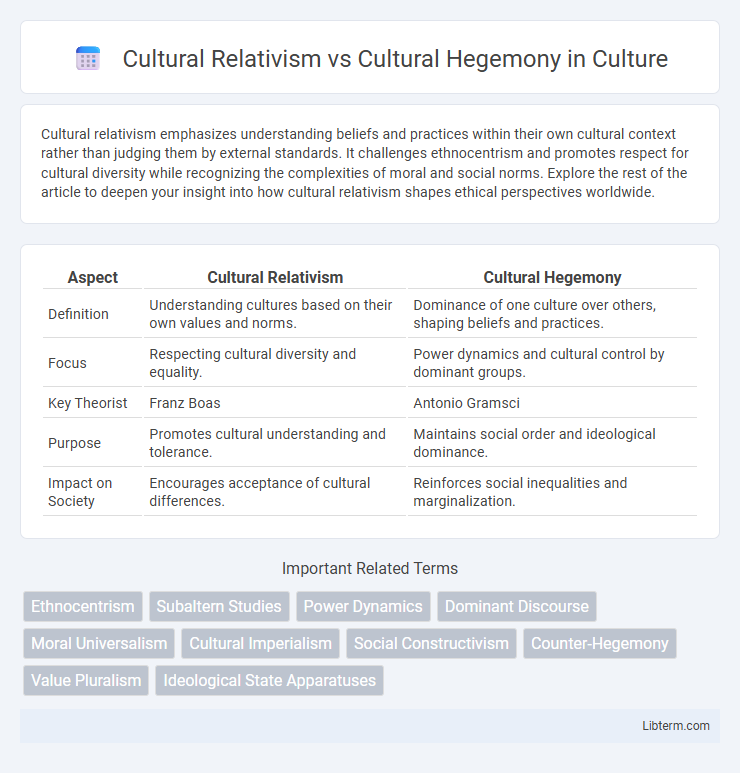Cultural relativism emphasizes understanding beliefs and practices within their own cultural context rather than judging them by external standards. It challenges ethnocentrism and promotes respect for cultural diversity while recognizing the complexities of moral and social norms. Explore the rest of the article to deepen your insight into how cultural relativism shapes ethical perspectives worldwide.
Table of Comparison
| Aspect | Cultural Relativism | Cultural Hegemony |
|---|---|---|
| Definition | Understanding cultures based on their own values and norms. | Dominance of one culture over others, shaping beliefs and practices. |
| Focus | Respecting cultural diversity and equality. | Power dynamics and cultural control by dominant groups. |
| Key Theorist | Franz Boas | Antonio Gramsci |
| Purpose | Promotes cultural understanding and tolerance. | Maintains social order and ideological dominance. |
| Impact on Society | Encourages acceptance of cultural differences. | Reinforces social inequalities and marginalization. |
Introduction to Cultural Relativism and Cultural Hegemony
Cultural relativism emphasizes understanding cultural practices and beliefs within their own societal context, avoiding ethnocentric judgment and promoting respect for diversity. Cultural hegemony, developed by Antonio Gramsci, describes how dominant groups maintain control by shaping cultural norms and values to preserve existing power structures. Both concepts explore the dynamics of culture shaping human behavior but differ in their perspectives on power and cultural interpretation.
Defining Cultural Relativism
Cultural relativism is the principle that an individual's beliefs and practices should be understood based on that person's own culture, avoiding ethnocentric judgments. It emphasizes the importance of context in interpreting cultural norms and behaviors without imposing external values. This concept opposes cultural hegemony, which involves the dominance of one culture's values and norms over others, often leading to the marginalization of subordinate cultures.
Understanding Cultural Hegemony
Cultural hegemony refers to the dominance of a particular culture or ideology that shapes societal norms and values, maintaining the power structures of ruling groups. It influences how knowledge, beliefs, and practices are accepted as common sense, often marginalizing alternative perspectives and reinforcing social inequalities. Understanding cultural hegemony involves analyzing the mechanisms through which dominant cultural narratives are perpetuated and internalized within a society.
Historical Origins and Key Theorists
Cultural relativism, rooted in early 20th-century anthropology by Franz Boas, emphasizes understanding cultures on their own terms without imposing external judgments. Cultural hegemony, a concept developed by Antonio Gramsci in the 1920s and 1930s, explains how dominant groups maintain power by shaping cultural norms and ideologies. Both frameworks critically analyze power dynamics within societies but diverge in focusing on cultural equality versus ideological dominance.
Comparing Cultural Relativism and Cultural Hegemony
Cultural relativism emphasizes understanding and evaluating cultural practices based on their own contexts without imposing external judgments, promoting respect for cultural diversity. In contrast, cultural hegemony describes the dominance of one culture's values and norms over others, often shaping societal beliefs through power structures and media influence. These concepts differ fundamentally in power dynamics: cultural relativism advocates for equality among cultures, whereas cultural hegemony highlights the imposition of cultural dominance and control.
Impact on Global Ethics and Morality
Cultural relativism promotes understanding and respect for diverse moral systems by asserting that ethical values are culture-specific, fostering tolerance in global interactions. Cultural hegemony, however, imposes dominant cultural norms and values worldwide, often marginalizing alternative moral frameworks and creating ethical homogenization. This dynamic profoundly influences global ethics by challenging the balance between respecting cultural diversity and addressing universal moral principles.
Influence on Social Institutions and Power Dynamics
Cultural relativism promotes understanding social institutions through the lens of cultural context, emphasizing respect for diverse value systems and reducing ethnocentric bias in power relations. Cultural hegemony, as theorized by Gramsci, describes how dominant groups maintain control over social institutions by shaping cultural norms and ideologies, consolidating power through consent rather than coercion. The interaction between these concepts reveals how hegemonic forces can suppress marginalized cultures, while cultural relativism challenges institutional power by validating alternative worldviews and promoting social equity.
Real-World Examples and Case Studies
Cultural relativism emphasizes understanding cultural practices and beliefs within their own context, as seen in anthropological studies of indigenous tribes whose customs differ from Western norms without judgment. Cultural hegemony, a concept developed by Antonio Gramsci, illustrates the dominance of one culture's values and ideologies, exemplified by Western media influencing global perceptions and eroding local traditions in post-colonial societies like India. Case studies from Nigeria highlight tensions where cultural relativism seeks to preserve ethnic diversity, while hegemonic forces push for homogenization through national education systems promoting centralized cultural narratives.
Challenges and Criticisms of Both Concepts
Cultural relativism faces challenges in addressing moral disagreements, as its emphasis on understanding cultural practices without judgment may overlook human rights violations or ethical concerns. Cultural hegemony is criticized for oversimplifying power dynamics by portraying dominant culture as uniformly oppressive, failing to account for cultural resistance and hybrid identities. Both concepts struggle with balancing cultural respect and critical analysis, often encountering debates over cultural autonomy versus global ethical standards.
Conclusion: Navigating Cultures in a Globalized World
Navigating cultures in a globalized world demands balancing cultural relativism's respect for diverse practices with the critical awareness of cultural hegemony's power dynamics. Embracing cultural relativism promotes mutual understanding and tolerance, while recognizing cultural hegemony helps identify and challenge dominant narratives that marginalize minority cultures. Effective cross-cultural engagement requires ongoing dialogue and reflexivity to foster equity and coexistence in global interactions.
Cultural Relativism Infographic

 libterm.com
libterm.com